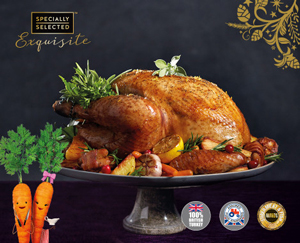 Amid negative headlines for the high street, supermarkets in the United Kingdom have painted a brighter picture, posting record sales of £29.3 billion over the Christmas trading period. Though lower inflation took its toll on sales, the latest grocery market share figures from Kantar Worldpanel, published on January 8 for the 12 weeks through December 30, 2018, show consumers still spent an extra £450 million on groceries compared with this timeframe during the previous year.
Amid negative headlines for the high street, supermarkets in the United Kingdom have painted a brighter picture, posting record sales of £29.3 billion over the Christmas trading period. Though lower inflation took its toll on sales, the latest grocery market share figures from Kantar Worldpanel, published on January 8 for the 12 weeks through December 30, 2018, show consumers still spent an extra £450 million on groceries compared with this timeframe during the previous year.
 Fraser McKevittFraser McKevitt, head of retail and consumer insight, commented: “Despite the supermarket sector growing at 1.6% – its slowest rate since March 2017, the retailers clocked in another record-breaking Christmas as households racked up an average spend of £383 in grocery bills for the month of December. Saturday, December 22 proved to be the busiest shopping day of the year: more than half of all households visited one of the grocers in a last-minute Christmas dash, with 1.7 million additional customers walking through the aisles compared to the Saturday before.”
Fraser McKevittFraser McKevitt, head of retail and consumer insight, commented: “Despite the supermarket sector growing at 1.6% – its slowest rate since March 2017, the retailers clocked in another record-breaking Christmas as households racked up an average spend of £383 in grocery bills for the month of December. Saturday, December 22 proved to be the busiest shopping day of the year: more than half of all households visited one of the grocers in a last-minute Christmas dash, with 1.7 million additional customers walking through the aisles compared to the Saturday before.”
He continued: “Although the grocers achieved record sales, overall spend was actually tempered by lower inflation of 1.3% – that’s less than half the level of like-for-like inflation of 3.6% which was recorded in Christmas 2017. This slower inflation rate helped shoppers to manage their festive budgets, with 60% of customers looking to make savvier decisions to make their money go further over the holidays.”
Seasonal confectionery hit the mark with shoppers – up 7% – while non-alcoholic beer and Christmas puddings clocked in sales of £7.6 million and £40.8 million respectively. Meanwhile whole turkeys fell out of favor and experienced a drop of 7% as some shoppers opted for smaller joints, such as crowns, in a bid to crack down on endless leftovers.
Premium Own Label Up
Although growing at half the rate of last year, premium private label lines still increased by 3.7% over the 12-week period – hitting a record £1.1 billion in sales – as customers looked to trade up on quality for their Christmas dinner.
 “Asda’s ‘Extra Special’ range was the fastest growing of any premium line of the major retailers, helping the supermarket achieve growth of 0.7% and come out top among the big four,” said McKevitt. “Asda was also bolstered by a standout online performance as its e-commerce sales rocketed by 12%.”
“Asda’s ‘Extra Special’ range was the fastest growing of any premium line of the major retailers, helping the supermarket achieve growth of 0.7% and come out top among the big four,” said McKevitt. “Asda was also bolstered by a standout online performance as its e-commerce sales rocketed by 12%.”
Almost neck and neck with Asda, Tesco experienced growth of 0.6% boosted by an extra 125,000 customers shopping at the supermarket, particularly at its larger stores. Tesco was the only retailer to increase promotional activity year-on-year, bringing in discounts such as its 29-pence pricing strategy on vegetables. Its market share now stands at 27.8% – down 0.3 percentage points compared with this time last year.
Sainsbury’s market share dropped by 0.3 percentage points as sales fell by 0.4%. With the Competition Market Authority’s verdict on the proposed Sainsbury’s-Asda merger predicted to be published in February, all eyes will be trained on Sainsbury’s over the next few weeks. Meanwhile, Morrisons’ market share declined by 0.2 percentage points to 10.6% despite sales growth of 0.1%.
 “The discounters have continued to make their mark over Christmas,” said McKevitt. “Two-thirds of all households shopped at either Aldi or Lidl over the 12-week period, culminating in a highest-ever combined Christmas market share of 12.8%. With sales up 10.4%, Aldi narrowly won the crown of the fastest-growing supermarket and it appears marketing efforts are paying off – at least when it comes to vegetables. The return of Kevin the Carrot contributed to an 18% increase in carrot sales, as nearly one in five households bought the vegetable at the discounter.”
“The discounters have continued to make their mark over Christmas,” said McKevitt. “Two-thirds of all households shopped at either Aldi or Lidl over the 12-week period, culminating in a highest-ever combined Christmas market share of 12.8%. With sales up 10.4%, Aldi narrowly won the crown of the fastest-growing supermarket and it appears marketing efforts are paying off – at least when it comes to vegetables. The return of Kevin the Carrot contributed to an 18% increase in carrot sales, as nearly one in five households bought the vegetable at the discounter.”
Lidl experienced growth of 9.4%. Nearly one-third of the supermarket’s December growth came through sales of branded products while its ‘Deluxe’ line saw sales jump by 33% over the month. Meanwhile, Co-op was the only retailer to beat its 2017 growth rate, and this now stands at 3.2%. The retailer’s market share increased for the seventh period in a row, most recently up by 0.1 percentage points to 5.9%. With 100 new stores set to open this year – a third of which will be in London and the Southeast – Co-op could see its good fortunes continue into 2019.
Iceland now accounts for 2.3% of the market – up 0.1 percentage points compared with this time last year. Four-fifths of its growth came from its non-frozen lines as perceptions of the retailer continue to shift. Sales at Waitrose dropped 1.7% and it now holds market share of 5.0% – down 0.2 percentage points. Meanwhile, Ocado’s market share fell by 0.1 percentage points despite growth of 1.3%.
“Unlike its high street counterpart, the grocery market has been less affected by the move to online,” noted McKevitt. “Although e-commerce is growing – up 3.9% compared to this time last year – online grocery shopping is failing to attract new customers. Instead, growth stemmed from existing customers spending an additional £9.07 over the month of December. Though not included in our till roll data set, Amazon remains one to watch as its FMCG sales jumped by 16% over the 12-week period.”
Update on Inflation
Grocery inflation now stands at +1.3% for the 12-week period ending December 30, 2018. Prices have been rising since the 12 weeks to January 1, 2017, following a period of grocery price deflation that ran for 30 consecutive periods from September 2014 to December 2016. Prices are rising fastest in markets such as fresh lamb, cola and batteries, while falling in fresh bacon and pork, instant coffee and fruit.





